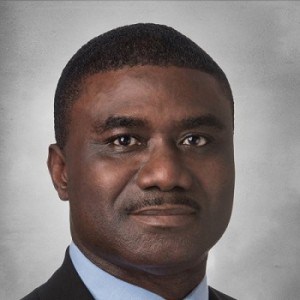World-renowned Inflammatory Bowel Disease specialist Leonard Baidoo, MD has joined the team at Regional One Health to treat conditions like Crohn’s disease and ulcerative colitis.
He plans to establish a world-class IBD Center that provides the type of cohesive, ongoing care that patients with a chronic condition require.
Along with delivering exceptional medical treatment, Dr. Baidoo looks to be a source of education and support for patients and their families.
Inflammatory Bowel Disease, or IBD, includes mainly two diseases: Crohn’s disease and ulcerative colitis. These are lifelong conditions that can be debilitating, and currently, in spite of all the research and clinical work done, there are no permanent cures – but with proper treatment, most patients lead normal, healthy lives.
Gastroenterologist Leonard Baidoo, MD, an internationally renowned IBD physician, is on a mission to make Regional One Health a leader in delivering that type of care.
As director of the University of Tennessee Inflammatory Bowel Disease Center, Dr. Baidoo is bringing this expert level of care in IBD treatment at Regional One Health’s Outpatient Center.
“IBD is a lifelong condition, and there is no cure. However, there are a lot of treatments, and if you use them correctly, people can live a normal life,” Dr. Baidoo said. “We offer the best therapies available and treat every patient as an individual. We listen to the patient for their preferences and input, and together we identify the therapy they need.”
Compassion and continuity of care are essential. “These are complicated, chronic diseases, so patients are often frustrated. You have to understand they may have seen multiple doctors for years with no relief,” Dr. Baidoo said. “For me, the goal is to treat every patient the right way and educate them about their condition. Everyone we see will leave with an understanding of the disease and what they can do to stay well and keep it from getting worse.”
IBD is a category of disorders that includes Crohn’s disease and ulcerative colitis. The most common symptoms include abdominal pain, fatigue, bloody diarrhea and weight loss, and Dr. Baidoo says any patient experiencing these issues should see a physician right away.

Leonard Baidoo, MD is a world-renowned specialist in treating IBD. “IBD is a lifelong condition, and there is no cure. However, there are a lot of treatments, and if you use them correctly, people can live a normal life,” he says.
When he sees a patient, he uses tools including upper endoscopy, colonoscopy, CT, scans, MRI and blood tests to provide the most accurate diagnosis. From there, he will discuss the patient’s medical and surgical treatment options, always with the goal of taking the most conservative approach that can successfully address their symptoms and overall health.
Care will be delivered by a multidisciplinary team of gastroenterologists, colorectal surgeons, dieticians, psychologists, pathologists, radiologists, etc. By putting all the resources in one place, patients can access the cohesive, ongoing care that is crucial to managing a chronic condition.
Patients will also have access to the latest research, as Dr. Baidoo is building a voluntary registry for use in studies on new pharmaceutical and surgical therapies. He said this is crucial not only in providing excellent care, but in establishing Regional One Health as a go-to resource.
The IBD Center will also focus on the social and emotional wellbeing of patients and families.
Dr. Baidoo plans to host sessions for patients’ loved ones and relatives to discuss concerns about everything from fertility and sexuality to the social impacts of IBD. He plans to establish an ambassador program that connects patients with one another for guidance and support and plans to offer a dedicated phone service so patients can always reach their medical team to ask questions.
The comprehensive approach follows the proven model Dr. Baidoo helped to developed when building world-class IBD programs at the University of Pittsburg and Chicago’s Northwestern University.
Dr. Baidoo was drawn to the field of IBD after noticing other physicians shy away from specializing in the condition. It motivated him to learn more so he could help patients in need.
After earning his degree at University of Ghana Medical School, he completed an internal medicine residency at Oxford University Affiliated Hospitals and a gastroenterology fellowship at the Graduate Hospital, MCP Hahneman University in Philadelphia. Following his fellowship, Dr. Baidoo completed advanced training in the treatment of Inflammatory Bowel Disease.

Symptoms of IBD include abdominal pain, bloody diarrhea and weight loss. Dr. Baidoo says you should see a physician right away if you have these symptoms to discuss medical and surgical treatment options.
From there, he moved to the University of Pittsburg and helped build one of the nation’s premier IBD treatment programs. After six years, he accepted an offer to be the Clinical Director of a similar center at Northwestern University Feinberg School of Medicine.
With both centers well-established as leaders in patient care and advancing the field of treating IBD, he looked for his next opportunity to make care more accessible.
For Dr. Baidoo, building something from the ground up to fill an unmet need is one of the most rewarding aspects of medicine – and that drew him to Regional One Health.
“In the Memphis area there is no institution that specializes in IBD, and there are a lot of patients in need of care and education,” he said. “Our plan is to create an IBD center to cater to West Tennessee and parts of Arkansas and Mississippi.”
He said the basic infrastructure is already in place, and he is excited to add the specialists, care standards, research and expertise that patients need.
“As a physician, it’s not enough to just see patients every day,” he said. “You need to create a system where you’re able to measure your success, contribute new research and develop a team where everyone delivers the same level of care so every patient can receive the best treatment.”